#it is lampshaded in a very specific way throughout the rest of the series
Text
utena being a story about stories is great. anthy stabbing utena being treated as a real wound instead of it being the obvious stage trick that it is, the sword passing under her right arm, on the side opposite to the audience, is so fucking good.
#rgu#i guess you could interpret it as anthy actually physically stabbing her#but i don't think this fits with the way that utena's visual language speaks about violence#it is lampshaded in a very specific way throughout the rest of the series#with the spinning rose emblem blocking the portion of the screen that they wish to conceal#but this doesn't happen#there is a hard cut#put in place specifically to give the audience the impression that utena has been mortally wounded#but the rest of the show also implies that anthy has some measure of control over the framing of scenes#specifically she uses this to hide her face and true feelings throughout#anthy is betraying her#she wants the audience and utena to believe this#but i don't think she stabs her#this dovetails into why i think the swords of hatred never touch utena#we don't see it even in the stage performance manner of the show
8 notes
·
View notes
Text
A Game of Thrones 10th Anniversary Season Ranking: Part 2
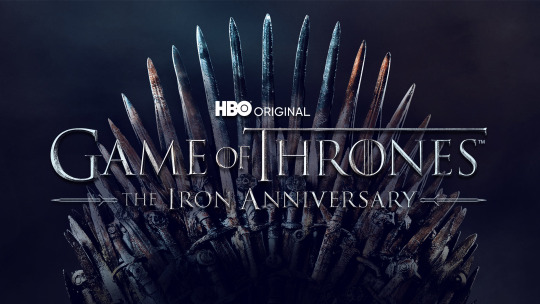
Link to Part 1
Time for the bottom half of the list. The four seasons here will surprise no one, but the order might.
#5 Season 6
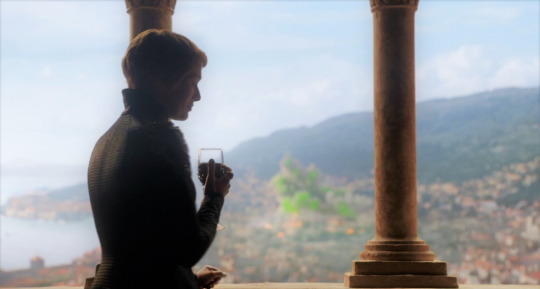
You can tell what I most what to talk about here...but there's an order to these things.
S6 actually has a bunch of great ideas, but they drown beneath the most slapdash plotting and character work the show has seen yet in order to set the stage for the narrower conflicts of the last two seasons. It's notorious for bringing back characters who haven't been seen in a season or longer only to kill them off (Balon Greyjoy, Osha, Hodor, the Blackfish, Rickon, Walder Frey) or awkwardly graft them back into the main plot (Sandor Clegane, Bran). There are plot threads that ought to be compelling but are too rushed in execution, like the siege of Riverrun, Littlefinger's hand in the Battle of the Bastards, or Daenerys's time back among the Dothraki and then finally getting the hell out of Meereen. Arya hits on the only interesting part of her two-season sojourn in Braavos - a stage play, of all things - only for it to stumble at the end with a disappointing offscreen death and some incomprehensible philosophy ahead of the start of her murder tour of Westeros. There's also so much cutting off the branches, enough to be conspicuous; the final shot of Daenerys leading an armada of about half the remaining cast she assembled partially offscreen says that better than anything else. Well, not anything....
Highlight: Without exaggeration, the opening of S6E10 is easily my favorite sequence in all of GoT. The staging, the music, the mounting suspense even as it becomes increasingly obvious what's about to happen, the twisted religious references particularly in Cersei's mock confession to Unella, Tommen throwing himself out a window because he can't deal with the reality of how terrible his mother is, how Cersei gives absolutely no fucks whatsoever about murdering hundreds of people at once in a calculated act of vengeance largely prompted by her own poorly thought out actions - I love it all. It's the single most masterfully-executed act of villainy in the whole show - Daenerys torching King's Landing probably has a higher body count, but the presentation there is all muddled - and if I had any doubts about Cersei being my favorite multi-season major character they were silenced in this moment. The explosion of the Sept doesn't sit perfectly with me, because I liked the Tyrells and because of what I said about deaths like theirs and Renly's in the previous post under S2, but I think that unease only cements the strength of this sequence. It's an overused phrase in fandom these days, but GoT at its best is all about moral greyness that gives its audience room for multilayered reactions. Cersei nuking the Sept and making herself the sole power in King's Landing, which in a sense is just a more overt example of the kind of character/plot consolidation elsewhere represented by Daenerys's armada, is one of those events that's impossible to approach from a single angle if you care about any of the characters involved. And hey, it's not in the books (yet, presumably), so unlike Ned's death or the Red Wedding the GoT showrunners can take the credit for realizing this one.
Favorite death: Even leaving aside the Sept and related deaths there's a lot of good ones to choose from in S6. Ramsey is cathartic but too gory for me, Osha's was a clever callback but a little delayed, it's hard to pin down specific deaths when Daenerys incinerates the khals, and Arya only gets half credit for Walder Frey and his sons when she saves the rest of the house for the opening of S7. I'm thinking Hodor, not so much because I enjoy his character or the manner of his death but because it's a clever bit of playing with language (that must have been hell to render in other languages for dubbing) wrapped up in some entertainingly murky consent issues and some closed time loop weirdness. It's all very...extra? Is that the word for it?
Least favorite death: Offscreen deaths continue to be mostly letdowns, in this case Blackfish and the Waif. Way to botch the ending of Arya's already near-pointless Braavos arc, guys. Speaking of Arya, this spot goes to Lady Crane, whom the Waif somehow kills with a stool or something. It's a dumb way to send off an entertaining minor character.
#6 Season 8
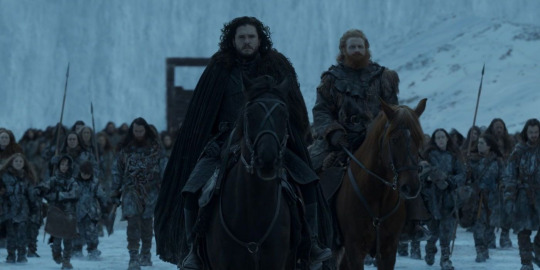
I swear that I'm not putting S8 this high solely because of Jonmund kind of sort of happening. I've never been very interested in either of them and the sex would be far too bear-on-otter to suit my pornographic preferences, but even so the choice to close out the series with them is hilarious.
I really don't need to elaborate on why S8 is down here; everyone who's ever watched the show has done as much in the nearly two years since it wrapped up. I do however need to explain why I've ranked not one but two seasons below it. My biggest argument here is that I don't believe it's fair to critique S8 for problems it inherited from earlier seasons. A non-comprehensive list:
Mad Queen Daenerys: unevenly built up beginning from S1 and continuing in some form through every following season
The questionable racial optics of Dany's army: also seeded as early as S1 and solidified by S3 with the Slaver's Bay arc
Cersei only succeeding because she makes stupid decisions and then lucks out until she doesn't: apparent from S1, directly lampshaded by Tywin in S3, fully on display with the Faith Militant arc of S5-6
Jaime not getting a redemption arc or falling in love with Brienne: evident with his repeated returns to Cersei throughout the show as one of the most consistent elements of his character, particularly in S4 and during the siege of Riverrun in S6
Tyrion grabbing the idiot ball/becoming a flat audience surrogate mouthpiece: started in S5 around the time the showrunners ran out of book material for him and wanted to make him more of a PoV character and his arc less of a downward spiral, although I've seen arguments that changes from the books involving his Tysha story and Shae set him on this trajectory even earlier
The hardening of Sansa's character: began in earnest in S4 and never let up from there
The strange ordering of antagonists: set down by S7's equally strange plot structure - the Night King had to come first with that setup
CleganeBowl and the dumber twists: from what I've heard the whole thing of writing around fans on the internet guessing plot twists started pretty much when the book content ended, so S5-6 maybe?
Yes, there's plenty to criticize about S8 on its own merits...but just as much that was merely the writers doing what they could at that point with deeply flawed material.
Highlight: This may sound cheesy, but the better parts of S8 are almost all the cinematic ones, whether that's E2 being a bottle episode with tons of poignant character send-offs before the big battle, a handful of deaths with actual satisfying weight like Jorah's and Theon's, and an epilogue that incorporates both closure for individuals and the broader uncertainty of messy socio-political systems that GoT has always been known for before working its way back to the Starks at the very end for some tidy bookending. Even imperfect moments like the Lannister twins' death and the resolution of Sansa's character felt weighty and appropriate based on what had come before.
Favorite death: Forget about the audio commentary attempting to flatten Cersei's character; Cersei and Jaime Lannister have an excellent end. Cersei especially, as the scenes of her stumbling her way down into the catacombs as the Red Keep crashes down around her really show off how her world is abruptly falling apart and how she retreats into her own self-interest at the end in spite of her demise being at least partially of her own doing. There's some stupid moments associated with these scenes, like Jaime dueling Euron to the death and CleganeBowl, but I can excuse those when the twins end up dying exactly where you'd expect them to: in each other's arms, in a ruined monument to their family's grand ambitions that, like Casterly Rock itself, was taken from another family.
Least favorite death: Quite a few dumb ones in S8 have become forever infamous. Missandei sticks out, and for me Varys too just as much because of how the writing pushes him to do the dumbest thing he could possibly do purely for the sake of killing him off ten minutes into the penultimate episode. But no one belongs here more than Daenerys Targaryen, killed at the height of a rushed and uncertain villain reveal by a man who takes advantage of their romantic history (who is also her family, because Targaryens) to stab her in a moment of vulnerability - pretty much only because another man tells him that Daenerys is the final boss. Narratively speaking that might be the case, but even so this is the end result of multiple seasons of middling-to-bad buildup. Not even Drogon burning the symbolism can salvage that. Also Fire Emblem: Three Houses did this scene and did it better.
#7 Season 5
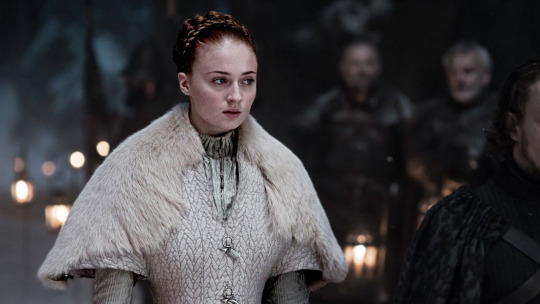
...Yeah, we're going to have to go there.
Sansa's rape is not a plot point that personally touches me much. It's terribly framed in the moment and the followup in later seasons is inconsistent at best, but it's not a kind of trauma I can relate to. On the other hand, in the very same episode Loras is tried and imprisoned for homosexuality, and Margery faces the same punishment for lying for her brother. That hits much closer to home, not just for the homophobia but also for the culture war undertones of the not!French Tyrells persecuted by a not!Anglo fanatic who later reveals himself to be the in-universe equivalent of a Protestant. The trial is just one part of Cersei's shortsighted scheming, just as Sansa being married off to Ramsey is part of Littlefinger's, and both of them get their comeuppance in the end...but it's unsettling all the same. I especially hate what the Faith Militant arc does to King's Landing in S5, swiftly converting it from my favorite setting in GoT to a tense theocratic nightmare that only remains interesting to me because Cersei is consistently awesome. What's more, pretty much everything about S5 that isn't viscerally uncomfortable is dragged out and dull instead: the Dorne arc, Daenerys's second season in Meereen, Arya in Braavos, Stannis and co. at Castle Black. The most any of these storylines can hope for is some kind of bombastic finale, and while several of them deliver it's not enough to make up for what comes before, or how disappointing everything here builds from S4. S4 has Oberyn, S5 has the Sand Snakes - I think that sums up the contrast well.
Highlight: S5 does get stronger near the end. As much as his character annoys me I did like the High Sparrow revealing his pseudo-Protestant bent to Cersei just before he imprisons her, and there's a cathartic rawness to Cersei's walk of atonement where you can both feel her pain and humiliation and understand that she's getting exactly what she deserves (and this is what leads into the climax of S6, so it deserves points just for that). The swiftness of Stannis's fall renders his death and that of his family a bit hollow, but it's brutal and final and fittingly ignominious for a character with such grand ambitions but so little relevance to the larger story. The fighting pits of Meereen sequence is cinematic if nothing else, and even the resolution to the Dorne arc salvages the whole thing a tiny bit by playing into the retributive cycles of vengeance idea (and Myrcella knows about the twincest and doesn't care, aww - no idea why that stuck with me, but it's cute all the same). Oh, and Hardhome...it's alright. Not great, not crap, but alright.
Favorite death: I don't know why, but Theon tossing Myranda to her death is always funny to me. Maybe because it's so unexpected?
Least favorite death: Arya's execution of Meryn Trant is meant to be another one of the season's big finale moments, but the scene is graphic and goes on forever and I can't help but be grossed out. This is different from, say, Shireen's death, which is supposed to be painful to witness.
#8 Season 7

I can't tell if S7's low ranking is as self-explanatory as S8's or not. At least one recent retrospective on GoT's ruined legacy I've come across outright asserts that S7 is judged less harshly in light of how bad S8 was. If it were not immediately obvious by where I've placed each of them, I don't share that opinion.
Because S7 is just a mess, and the drop-off in quality is so much more painful here than it is anywhere else in the series except maybe from S4 to S5 (and that's more about S4 being as good as it is). The pacing ramps up to uncomfortable levels to match the shortened seasons, the structure pivots awkwardly halfway through from Daenerys vs. Cersei to Jon/Dany caring about ice zombies, said pivot relies largely on characters (mostly Tyrion) making a series of catastrophically stupid tactical decisions, and very few of the smaller set pieces land with any real impact as the show's focus narrows to its endgame conflict. As with S6 there are still some good ideas, but they're botched in execution. The conflict between Sansa and Arya matches their characters, but the leadup to that conflict ending with Littlefinger's execution is missing some key steps. Daenerys's diverse armada pitted against Cersei weaponizing the xenophobia of the people of King's Landing could have been interesting, but there's little room to explore that when Cersei keeps winning only because Tyrion has such a firm grip on the idiot ball and when Euron gets so much screentime he barely warrants. Speaking of Tyrion's idiot ball, does anyone like the heist film-esque ice zombie retrieval plotline? Its stupidity is matched only by its utter futility, because Cersei isn't trustworthy and nobody seems to ever get that.
And how could I forget Sam's shit montage? Sums up S7 perfectly, really. To think that that is part of the only extended length of time the show ever spends in the Reach....
Highlight: A handful of character moments save this season from being irredeemable garbage. As you can guess from my screencap choice, Olenna's final scene is one of them, even if Highgarden itself is given insultingly short shrift. S7 also manages what I thought was previously impossible in that it makes me care somewhat about Ellaria Sand, courtesy of the awful death Cersei plans for her and her remaining daughter. The other Sand Snakes are killed with their own weapons, which shows off Euron's demented creativity if nothing else. I like the entertainingly twisted choice to cut the Jon/Dany sex scene with the reveal that they're related. And, uh...the Jonmund ship tease kind of makes the zombie retrieval team bearable? I'm really grasping at straws here.
Favorite death: It's more about her final dialogue with Jaime than her actual death, but again I'm going to have to highlight Olenna Tyrell here for lack of better options. She drops the bombshell about Joffrey that the audience figured out almost as soon as it happened but still, makes it plain what I've been saying about how Jaime's arc has never really been about redemption, and is just about the only person to ever call Cersei out for that whole mass murder thing. There's a reason "I want her to know it was me" became a meme format.
Least favorite death: There aren't any glaringly bad deaths in S7, just mediocre or unremarkable ones. I still think the decision to have Arya finish off House Frey in the season's opening rather than along with their father at the end of S6 was a strange one that doesn't add much of dramatic value.
4 notes
·
View notes
Text
Gem Ascension Tropes (Peridot-specific: F - G)


Reference:
Primary Peri Post ▼ Primary General Post ▼ Full Article
Face Death with Dignity: Peridot refuses to let Garnet and Steven see her upset with her situation, so she forces herself to smile and laugh at them in hopes of making this (presumed) final goodbye easier for them. After they’re gone, Peridot’s tries to take her fate in stride as she grades her own performance before White Diamond finally captures her. Peridot’s reaction?
Peridot: “Oh. You’re here. Took you long enough.”
Face: Simultaneously the Underdog and The Anti-Hero types.
Falling into His Arms: This almost happened in the climax of Act I, but Peridot’s clumsy nature not only ruined this moment, but also any chance of her escaping Homeworld with her friends… let alone Steven catching her. When a fragmented part of Peridot’s personality is liberated by Steven later in Act III, she excitedly runs to him, trips, and this time the trope is played straight. It happens again in This is Who I Am Chapter 4; this time Peridot actually reflects on how wonderful it feels to be able to do this, after the catastrophic way her first attempt failed (to such a degree that Peridot thought she’d never be able to experience this at the time; initially resigned to believe Steven would never come back for her).
Fighting from the Inside: Attempted with Celadon Diamond. When Celadon intends to blow up the Crystal Gems’ spaceship (with allies still inside), Peridot tries her hardest to make Celadon resist, especially since it’s her power that’s going to be used to kill her friends. Ultimately, Peridot succeeds in breaking out, but that only happens when she realizes Pumpkin is mortally wounded.
Fire-Forged Friends: With Lapis.
First Kiss: Experiences this with Steven in Chapter 5 of Act I.
Fist of Rage: Peridot has moments like these throughout the primary GA series, as well as the stories outside it – the narrative will be sure to point out when she’s doing it, as it’s a red flag that Peridot is actively struggling to maintain her self-control despite her powerful emotions threatening to overtake her.
Following in Her Rescuer’s Footsteps: This trope was already somewhat in effect in canon, as Peridot is very dedicated to becoming a full-time Crystal Gem. It’s taken to another level in GA when Peridot realizes the rescuers who helped her get this far need saving. Due to the high stakes of the mission she has to embark on to rescue them, Peridot actually takes her position as The Leader seriously. Instead of trying to be just like Garnet as she did during her brief stint with the Crystal Temps, Peridot is concentrating on leading in her own way while following Garnet’s example more loosely. This surprisingly leads to a permanent promotion for Peridot in the post-GA story Plans Change.
Foolish Sibling, Responsible Sibling: The foolish sibling to 5XF’s responsible one. Played straight for the first half of This is Who I Am; then gets Zig-Zagged after 5XF’s Face-Heel Turn, which puts Peridot in a scenario where she pretty much has to be responsible and mature just so she and Steven can make it out of their situation alive. 5XF, by contrast, is corrupted with power and mentally unstable, making her the foolish one. By Chapter 7, the sisters are roughly back in their original roles. 5XF’s Character Development has made her much less rigid, but at her core, she remains to be much more mature and sensible than Peridot. Of course, Peridot actually has good reasons to act like a foolish brat by this point…
Foreseeing My Death: From the start, Peridot had a strong feeling she specifically wouldn’t come out of this rescue mission alive. She was so certain of this that she made Video Wills to each of her friends during her downtime periods in building the spaceship on Earth and in the ship’s isolation chamber en route to Homeworld.
Forgot About Her Powers: Happens in Chapter 2 of This is Who I Am, when Peridot and 5XF are facing an alligator – a dangerous creature neither know anything about – but Peridot could easily deal with it in so many ways given the nature of her power. A bit justified, as Steven lampshades and later discusses this trope to 5XF, explaining Peridot hasn’t had her new powers for long (this story takes place less than a week after GA’s third act), and getting startled, scared, or otherwise mentally frazzled will make Peridot slip into this trope. Basically, Peridot’s still getting used to them, and Peridot herself mentions beforehand that she’s afraid to try anything on the gator directly, as she knows she’ll never hear the end of it from Steven should she accidentally kill it.
Forgot About the Mind Reader: The Feeling Reader, more accurately. Near the start of Plans Change when a clearly not-fine Peridot is trying desperately to convince Steven she is fine, Steven reminds her that as a result of his powers evolving since the main series, he can read unspoken feelings. No matter what Peridot says, Steven will always be able to figure out what’s really in her heart. Needless to say, Peridot’s a bit miffed that her usual boasts and bluffs won’t work on her boyfriend anymore.
Four-Philosophy Ensemble
The Optimist: A Determinator like her has to be this. Even though her philosophy clashes terribly with this role, Peridot’s Character Development has at times caused her to favor sentiment over logic. She’s still prone to recklessness, and she tries her hardest to keep an optimistic outlook on her mission, even when she’s internally tormented with fear and anticipating worst-case scenarios. And as The Atoner, Peridot does go out of her way to do the right thing so long as doing so won’t jeopardize her friends’ lives.
Four-Temperament Ensemble: Peridot represents the Choleric of her division. Since there’s heavy emphasis on her becoming a legitimate Hero Protagonist, she shares the following traits: total workaholic, very strong-willed, task-oriented, taking the lead, practical, hot-headed, rebellious nature, rude with very questionable social skills overall, condescending as an insufferable genius would be, vindictive immaturity, a bit obsessive with achieving her goals, and overall being very tsundere.
Friendless Background: By choice; Fear was the motive here, as while Peridot literally couldn’t comprehend what a friend was when she lived on Homeworld, she knew her fellow gems who sought this kind of bond were easy to manipulate to further her own agenda. Most Peridots rightfully steered clear of 5XG because she was a notorious manipulative sociopath, but on plenty of occasions, some would come along who didn’t know any better and tried to reach out to Peridot, and she would never hesitate to play along until she no longer had a use for them; more often than not, that would result in the unsuspecting gem’s demise.
Fright Deathtrap: Very narrowly averts putting White Diamond through a scared stiff variation to lethal levels. Peridot halts her Backstab Backfire attack when it’s mere inches away from White’s face. White, who was bracing herself for shattering, opens her eyes to see this and is shown destabilizing out of sheer shock. Peridot realizes in this moment it’s much more satisfactory to potentially scare White to death than to shatter her the old-fashioned way, but out of respect to Steven, she doesn’t take it any further than this.
From Nobody to Nightmare: A simple way to describe Peridot’s backstory before she was assigned to Earth. Peridot was never given special treatment, but earning respect for being resistant to pain shortly after she emerged became a gateway for Peridot to make herself stand out from her kin in good ways, but mostly very bad ways, as she was a consummate Manipulative Bastard. Many relatively innocent Peridots lost their lives because of her ambition to keep rising up the ranks. All of this was long before Peridot learned she was an Unwitting Test Subject. And while Peridot herself was an entirely different gem by that point, the very nature of her powers and Peridot’s own mental instability came close to killing herself and all of her friends during the climax of Act III. Of course, White Diamond can be thanked for orchestrating all of that.
Gadgeteer Genius: Per canon. She mostly displays this in Chapter 3 of Act I when she loads Greg with all sorts of devices to serve as a means of defending himself and their ship.Get a Hold of Yourself, Man!: Gives Steven this kind of speech in Chapter 6 of Act I after Steven, instead of escaping White Diamond, is standing out in the open blubbering because Bismuth had to execute White Pearl for their own safety. While Peridot tries to be gentle with Steven (even starting it with a Motivational/“Shut Up” Kiss), she doesn’t hesitate to be brutally honest with him, even if Steven is her Love Interest.
Get It Over With: Once White Diamond reaches Peridot at the end of Act I, well after the rest of the Crystal Gems have fled Homeworld, Peridot greets her with a smartass remark that is basically an attempt to bait White into doing this. However, no more of their interaction is shown after this moment. By the end of Act II, all that is known is that Peridot is with White Diamond six days after that moment, albeit in her base gemstone form, meaning she likely poofed shortly after said baiting. It isn’t until Act III begins when it’s revealed why exactly White has gone out of her way to keep Peridot alive this long.
The Glomp: The moment Peridot finally sees Steven alive and well, her first reaction is an extreme version of this. She basically tackles him off Lion to hug and cry over him in sheer relief, all the while berating Steven for his gullibility with very weak punches to his shoulder. Peridot somehow does this despite three of her four limbs being borderline crippled.
Glory Seeker: Per canon, but downplayed in GA. While Peridot wants her peers to recognize how awesome she can be in an authoritative position and is filled with glee when she imagines Garnet, Pearl, and Amethyst’s reactions to who organized the rescue mission to save their lives, it doesn’t prevent Peridot from staying focused on her objective. She does go out of her way to conceal her insecurities, however, as Peridot desperately does not want her teammates to be under the impression that she’s even slightly vulnerable, but is in fact as almighty as she makes herself out to be. By Act III, this trope becomes a non-factor.
Go on Without Me: Steven’s first reaction after Peridot’s Twisted Ankle moment is to attempt to bash the door down, but it’s too sturdy. There isn’t enough time for him or Garnet to make it through to Peridot, and Peridot herself is fatigued, concussed, and not equipped to hack her way to freedom. She can’t verbally communicate with them through the door, but she does gesture to their exit route, smiling and laughing to deter either of them from wasting any more time saving her before they’re all caught by White Diamond.
Go Out with a Smile: She not only offers this to Steven and Garnet at the end of Act I, but also laughs at them both with nary a tear to be seen.
Goggles Do Nothing: Downplayed and subverted. Peridot’s visor served no obvious functional purpose, though it ultimately protected her gemstone from sustaining damage when Peridot’s Twisted Ankle moment sends her head crashing roughly into a metal-plated gate. At the end of Act II, it’s noted in the narrative that they doubled as Night-Vision Goggles. Thematically, the visor did serve a purpose in keeping Peridot’s Mismatched Eyes hidden from everyone (even herself) for her entire life until it was shattered.
Good is Not Nice: This is Insufferable Genius Peridot we’re talking about. She definitely crosses the line more often than her teammates care for. Then there’s her past life as a Manipulative Bastard…
#gem ascension#gem ascension tropes#gem re:ascension#ga references#tv tropes#steven universe#su fanfiction#su fanfic#stevidot#peridot#su peridot#lapis lazuli#su lapis#bismuth#su bismuth#garnet#su garnet#amethyst#su amethyst#pearl#su pearl#su pumpkin#greg universe#connie maheswaran#white diamond#yellow diamond#pink diamond#yellow pearl#jasper#su jasper
0 notes
Note
Because you were talking about Juzo, I'm curious, why was Kirigiri one of your favorites as well? I feel her character development was minimalistic at best and was dropped after the first game, especially in the dr3 anime
Although Ouma is definitely myfavorite ndrv3 character, I’ve been joking a lot lately that Saihara is the one Iactually relate to the most—because I too am an anxious depressed mess, feelsocially awkward at all times, and am a huge Kirigiri fan.
While Kirigiri is certainly nota character to demonstrate her emotions very noticeably outward, I wouldn’t saythat her development is minimalistic in the first game. If anything, Kirigiriis one of the characters whose growth and development is followed the most bythe first game, after Naegi.
The thing is, her developmentstarts from a different position than Naegi’s. Rather than starting from astandpoint of being naïve and overly optimistic or trusting, Kirigiri startsout rather like Ouma, actually. She’s rather cynical at heart, especially indr1, something many people tend to forget about her character. As a detective,she accepts what neither Saihara nor Jin Kirigiri want to accept about theirjob: that people have to be doubted, suspected, and questioned.
Dr3 certainly does drop theball on her character development, but, well—it did that for everyone’scharacter development, pretty much. Future Arc started strong, showed lots ofpromise, and then sadly ruined all the potential it had with weak writing. Bydelegating Kirigiri to the role of “damsel in distress” and “beautiful self-sacrificingcinnamon roll” all at once, dr3 did a really bad job at remembering whyKirigiri became so popular in the first place, because she never used to fitinto those character tropes typically reserved for female characters in the DRseries.
While I’m glad she lived (Seiko’santidote bottle was something I noticed right away when her “death” episodefirst aired, so the foreshadowing was definitely there), I don’t feel dr3 didher justice by any means. She was forced to take a backseat role; just as Chisawas used as nothing more than an object for Munakata’s character arc, Kirigiriwas forced to parallel her by being used as an object for Naegi’s arc. And thatwas a pretty huge insult to her character, in my opinion. Had the switch beenthe other way around, with Naegi sacrificing himself (in a wonderful throwbackto dr1 Chapter 5) and Kirigiri taking an unexpected protagonist role, I would’vebeen a lot more satisfied.
But unlike other DR characters,there are plenty of other materials besides just dr3 to give us insight intoKirigiri. The Kirigiri light novels, for one, as well as the new visual novel,Kirigiri Sou. Kirigiri’s continued popularity is a testament to what sherepresents to the DR series, from a mystery perspective. Just as Junko isiconic for her role as an antagonist, Kirigiri is iconic because of her role asnot only a detective, but thedetective. All the insight she provides Naegi and the player in dr1 about whatsolving a mystery entails, about how to reflect on the mindset of both victimsand culprits, as well as what exposing the truth really means, are themes thathave come up not only in dr1 but in every other DR installment to date,including ndrv3.
Kirigiri is perhaps thecharacter whose advice and teachings have lasted the longest. She instinctivelyunderstands, and helps the player understand, what a real mystery is all about.Where ndrv3 leads the player into a false sense of security before lampshadinghow ridiculous and utterly dangerous it is to trust people blindly, Kirigiriwarns Naegi of the dangers of blind trust and extreme paranoia as early asChapter 1 in dr1. While she’s certainly aloof and uninterested in socializing,especially at first, she’s someone who grasps what the “heart” of a mystery isall about, and helps guide Naegi and the player into understanding it too. Andunderstanding the “heart” is the first step to understanding any mystery presentedin the future, too.
Kirigiri starts dr1 as someonewho is level-headed, reasonable, and extremelysecretive (excessively so, sometimes). She’s smart, calm, and collected, butcertainly not infallible; having replayed dr1 quite recently myself, I’venoticed several instances in which her failure to take action as quickly as shecould’ve causes her to be surprised and blindsided when murders take placeelsewhere. Like Ouma, she often prioritizes her own objectives in: 1.)exploring the school and exposing the mastermind behind the whole game, and 2.)finding out the truth about her own memories, backstory, and talent, so smallerhurdles and culprits among the group can and often do throw her off guard.
Most importantly to note, she’snot a team player, especially not at first. Kirigiri’s cynicism and paranoiamakes it difficult for her to trust others besides herself, though notimpossible. The one major difference between her and Ouma is that Kirigiribelieved in the necessity of trust after doubting others first. Her bond oftrust with Naegi is something gradually developed throughout the course of dr1,slowly and steadily. It’s not something she would have developed with justanyone, but rather something she and Naegi both developed specifically becauseof their shared experiences with one another.
But she certainly didn’t careto explain her motivations or objectives to the rest of the group, nor did shebelieve in telling even Naegi about what she knew on anything more than a “need-to-know”basis. She’s extremely sensitive about people butting in on her personal life. Inher FTEs she says point-blank that she feels emotions just the same as otherpeople, but that she intentionally hides them behind a mask of composure—becauseshe has nothing to gain by tipping other people off as to what she’s feeling orthinking at the moment. In this sense, she’s also quite similar to Ouma. Butwhere Ouma’s mask is all about feigning every emotion, usually in a veryexaggerated fashion, Kirigiri’s is a mask of stoicism.
When others in the group wantto know where she’s been or what she’s been doing, she doesn’t feel any need totell them. Even when it clearly begins putting the group in a more disorganizedstate and things begin reaching a boiling point in Chapters 4 and 5, sheremains extremely closed-off and secretive, and it’s clear that there’s no onein the group she would trust with any of her personal information besidesNaegi. And even Naegi, she never tells the whole story to.
Naegi had to make a consciousdecision to cover for Kirigiri’s lie in Chapter 5—it wasn’t something sheprepared him for, and she knew there was a chance she might actually be sendinghim to his death, if Alter Ego failed to kick in. Still, it was a sacrifice shewas willing to make if need be, and that’s something incredibly cold andpragmatic and that I love to see in characters who are all about “the endsjustify the means.”
Just like Ouma, she wasabsolutely dead set on investigating things to the end. She couldn’t let thingsend with her death, which is why she refused to sacrifice herself in Chapter 5,just as Ouma initially refuses to let himself die in ndrv3 Chapter 4. Hertunnel vision towards stopping the mastermind and figuring out what happened toJin Kirigiri and how far he was involved with the killing game means that shedoesn’t want other people sticking their nose into her business.
Her feelings towards Jin arethe main proof of the fact that Kirigiri can also be driven by personalvendettas, pettiness, and unresolved anger and frustration. As someone who canperfectly understand the resentment towards an absent father figure, I alwaysappreciated that Kirigiri’s conflicted feelings about Jin were handled quitewell in dr1. The narrative ultimately focuses on the fact that yes, Jin lovedhis daughter and was a caring father, but he was also careless, overlytrusting, and thoughtless about how his actions would influence others.Kirigiri was allowed to be angry at Jinwhile also still caring about him, and that was a deeply realistic and humanreaction.
I appreciate the fact thatKirigiri, especially in dr1, was a character never played for fanservice, andnever used as an object of male character development or waifu-baiting. Therewas little to no forced romance between Naegi and Kirigiri in the first gamewhich is what led me to enjoying naegiri quite a lot on my own—when thenarrative isn’t trying to push it in a romantic connotation, I tend to warm upto these sorts of ships a lot faster. Dr1 was very emphatic about appreciatingtheir dynamic as friends first, withanything more than that being a matter of personal interpretation.
The fact that she’s extremelyintelligent, capable, and arguably a protagonist in her own right thanks tospinoffs like DR: Kirigiri and Kirigiri Sou now is a large part of the reasonwhy she’s still #2 on my overall DR ranking. Before Ouma came along, she wasactually #1 and I didn’t think anyone would ever shake her position. I stillreally enjoy her every time I do a reread; if anything, Ouma’s character hasmade me appreciate Kirigiri even more, given the noticeable similaritiesbetween them.
Anyway, these are just my personalthoughts on the subject! I’ve always appreciated that Kirigiri was a characterwho both embraces and embodies the role of a detective, but who alsounderstands the full meaning of “the truth,” and isn’t afraid to lie, cheat, orrely on other cold and calculating tactics in order to achieve her objectives. She’san extremely compelling female character in my opinion, and I’ll always have abig soft spot for her. Thanks for asking, anon!
#dr1#dangan ronpa#danganronpa#kyouko kirigiri#kirigiri kyouko#ndrv3 spoilers //#spoiler tag is there because i make a few comparisons to ouma!#my meta#okay to reblog#anonymous
50 notes
·
View notes
Text
Powerpuff Girls 2016 - “The Bubbles-Sitters Club”
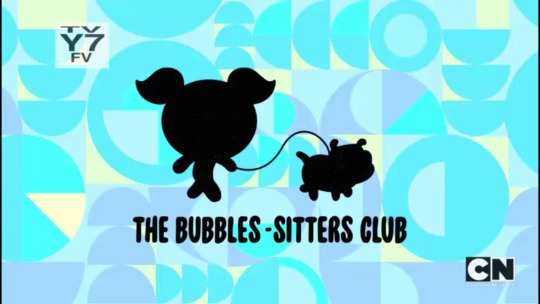
Written by: Haley Mancini, Jake Goldman
Written & Storyboarded by: Jaydeep Hasrajani, Leticia Abreu Silva
Directed by: Nick Jennings, Bob Boyle
Cartoon Network's Not-So-Great Idea.

The episode starts with Bubbles reading a comic strip named Smarmaduke. Get it, like Marmaduke! I'll give them this: a talking, smarmy dog does have a lot more potential than a half of century of "Great Danes are big" jokes.

This leads to Bubbles wanting a dog. Her reasoning? Because her life is so boring without one! Blossom, eating her cereal, reminds her about the whole "saving Townsville" thing they apparently do offscreen in this reboot, but Bubbles finds that boring. Yeah, forget superhero stories, this puppy plot is where it's at!
The Professor explains further that it takes a lot of responsibility to take care of a pet, and Bubbles is not ready for it. Bubbles is shocked at this accusation, and asks the Professor three reasons why she isn't responsible. Cue a montage, complete with some wacky Sesame Street-inspired numbers. Because Bubbles is the childish one!

She left the water on, causing the house to flood! A very quick scene, unlike the other two.
Blossom tells Bubbles to keep an eye on a tied up Gangreen Gang while she goes and gets the cops, because the Puffs can't possibly deal with them themselves, but she ends up getting distracted by a butterfly! This leads to the Gangreen Gang escaping from rope, proving that they are stronger than the Reboot Puffs.
While a pirate goes to the "little captain's room", Bubbles wrecks his ship on an iceberg she was specifically told to avoid! Random!
Blossom finds a classified ad asking for a dog-sitter, no experience necessary. Seeing this as a test, they all agree that if she can pass it, she can have a dog. Bubbles promises the Professor that he can say goodbye to the irresponsible Bubbles he once knew. I got to used to saying goodbye to the Bubbles I once knew.
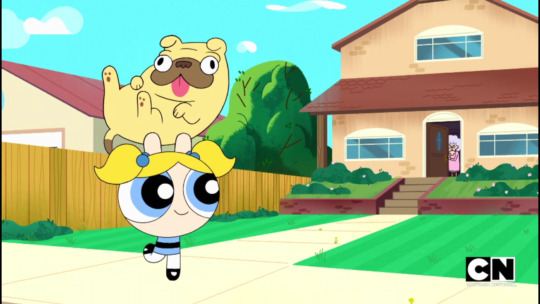
Bubbles gets her puppy from a strange old lady. This is the second hint that something can't be right, as the old lady just closes the door slowly. The first being, of course, "no experience necessary". Something's rotten in the city of Townsville, but Bubbles doesn't mind at all.
The episode uses Pauly's face as a transition throughout the episode. Very often, they use this transition between two scenes that take place in the same location. This is where you should have a "later" title card.
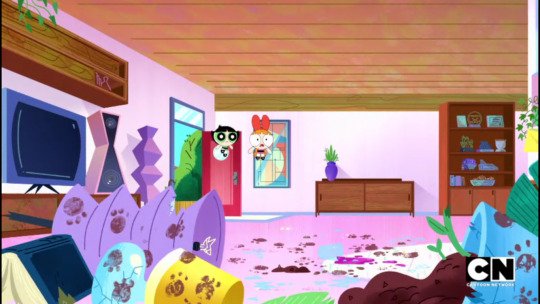
Blossom and Buttercup come home, Buttercup talking about how she licks ice cream off of bathroom floors, to a completely thrashed house. It turns out, Pauly isn't exactly well trained, and Bubbles isn't that good at training him. He eats up one of Blossom's favorite slippers, starts eating Buttercup's very stretchy hair, and he "makes a mess" behind the couch. That's pretty much a required joke with inexperienced pet owners.
The problem is that Bubbles just refuses to tell him "no", and Blossom tries to teach her.
Blossom: You have to tell him no if you want him to be good!
Bubbles: But he really likes being bad!
I wonder what the twist of the episode is. Suddenly, the dog keeps hitting his head on the couch. Seeing this as the dog having too much energy, Blossom tells Bubbles to take her dog for a walk. When she does, the dog keeps stopping at different stores. He stops at a pie store, but Bubbles tells him dogs don't eat pie. Pauly gives Bubbles those puppy dog eyes, and she allows him to go in. She eventually tells him that she won't buy anything else for him.

One dog transition later, and Bubbles buys absolutely everything for him. Even a treadmill to have him walk while they're walking, which she stops to lampshade. She even outright monologues about not being able to put her foot down. While she's talking to herself, Pauly starts robbing the diamond store she stopped by with a bat. What a twist, Pauly really likes being bad!
I know what some people might be thinking, and I'll answer that this is completely different from the original Cat Man Do. Get this, while that episode was about the Powerpuff Girls adopting an evil cat, this episode is about one of the Powerpuff Girls adopting an evil dog! It's totally different.
Also, this dog isn't an evil genius bent on turning man's best friend into the head of the house. He's just an ordinary robber, who happens to be a dog. Specifically, he reveals himself to be Pug-Faced Pauly, the greatest robber and criminal mastermind in Townsville. How does he reveal this?

By talking, of course. No, this isn't a "The Wild Thornberrys"-like way to show an animal talking to something with the gift of gab, Bubbles, and Buttercup later in the episode, outright says that he can talk. What use is the ability to talk to animals if every important animal seems to have human vocal cords? I wonder how Talking Dog feels about that.
In response, Bubbles does the thing she does best: tell the dog that he's a bad dog while shrinking her face. I didn't feel the need to screenshot it, because you can just look at the other 50 times I had to. She also threatens to take him to jail, without the help of those all important cops. The dog tells her that they put "bracelets" on her too for technically being his accomplice.
Oh, and he also says that Bubbles will never own a dog. Guess which one Bubbles is more worried about.
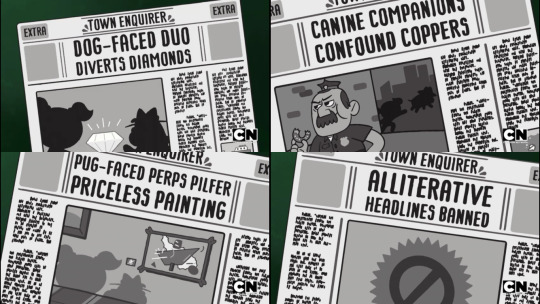
Not willing to lose her dog, Bubbles agrees to a new life of crime. We learn this from a bunch of alliterative headlines from the Town Enquirer. I guess Townsville doesn't think too highly of itself to put its name on the newspaper. Another difference from Cat Man Do: Hypnosis is not involved; Bubbles is just easy to force into these kinds of plots.
Blossom and Buttercup see Bubbles' head, covered with a mask, in the paper. Of course, Buttercup has to think about who it is for a while, because this show has to avert our expectations by making Buttercup the silly one in this episode. Blossom figures it out immediately, and they just somehow know where she is.
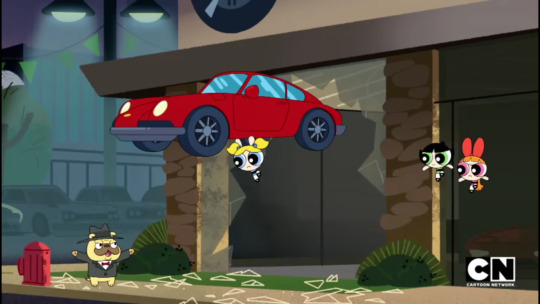
Before they get there, the dog is robbing another store. Bubbles is ordered to get the getaway car, which she brings by literally carrying it on her back. This plays both to the fact that she can’t drive and how she’s a superhero that can lift heavy things. Finally, another measure of her strength. A far less impressive one than the building full of people, but a little closer to her apparent strength in the rest of the reboot.
The rest of the Powerpuff Girls show up to stop Bubbles from obeying her dog. Buttercup tells him she's ready to knock off a few of his nine lives. Blossom tells Buttercup that's cats, not dogs. It's funny because Buttercup is the pinhead of the episode! Also, wanna guess how she says it?
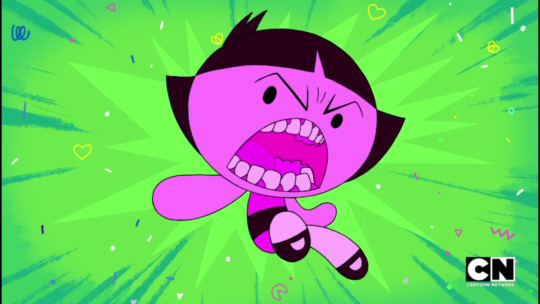
Buttercup: KNOCK OFF A FEW OF YOUR NINE LIVES!
It's also "funny" because it's off-model and badly animated! That's still a gag they're going to return to. I was hoping it wasn't, but here you go. Pauly blows a dog whistle, and a bunch of dogs show up. Even that strange old lady shows up, and she reveals herself to be...a dog with a duck's body! There's good twists, and there's twists that are completely random. It never really goes anywhere, and it's not even worth a screenshot.
I was expecting some sort of copout on this. The Powerpuff Girls, with their car-lifting strength, should have no problem with these dogs. Even with the Reboot Puffs, while they get beaten up by giant monsters or powerful robots, these are just ordinary dogs with human vocal cords and sense of style. But, they can’t possibly show a bunch of dogs getting beaten up, right?

Surprisingly, that’s what happens. Blossom and Buttercup fight a bunch of dogs in the same way they punched bank robbers. They tie into the dog theme by covering up most of the impact with hit flashes with dog puns in them. Fitting!
Bubbles is still conflicted, though, because she can't possibly disobey Pauly. While Blossom and Buttercup is fighting the dogs, they tell her to join in, while Pauly tells her to keep on doing crime. Eventually, the bickering causes Bubbles to snap, and she throws the getaway car at the dog. Wow, that's kind of harsh. He was an evil pug, but still.
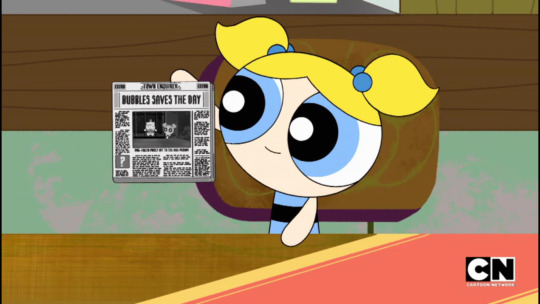
Nah, I'm kidding. Bubbles turns him in, Pauly only slightly bruised. She even gets all the credit, and doesn't have to go to jail despite being his accomplice, despite what Pauly threatened earlier. I would say Townsville realized having one of the reasons why their city isn’t a crater in the ground in "sing-sing" isn’t a good idea, but anyone other than Buttercup is kind of expendable in this reboot.
With the help of the Professor, who only appears in the beginning and end of the episode to tell the kids the moral, Bubbles learns that you have to be responsible for your pets, especially if they turn out to be criminals. She even reveals she got a new pet, who happens to be Reboot Jojo dressed like a cat! Is it Reboot Jojo in disguise doing a villainous plot, or is this another “Make Reboot Jojo the weakest villain” joke? It's the latter. Trust me.
Does the title fit?
Bubbles is a dog-sitter. While it's another "replace a word with a character's name" title, It's a little better because Bubbles and Baby both start with a B and have two syllables. That's how low the standards have to be with PPG 2016 titles.
How does it stack up?
I was worried this was going to be another “oh, Bubbles is so silly” episode, but it turned out to be just a boring evil animal episode. Sure, I do like that the Powerpuff Girls actually fight, but that’s like praising a dog for not peeing on the sofa. Sure, it’s pleasant, especially if said dog tends to pee on the sofa, but I should expect better.
The keyword, of course, being "should". After watching so much of this reboot, I fear that my mind is getting numbed. Not among the worst, not among the best. Closer to the worst, but not that close. I really need to higher my standards.

Next, Buttercup fights an evil adversary. Oh no, not Reboot Jojo, not Silico...it's math. Honestly, I think spelling should be PPG 2016′s mortal enemy. They've been a little better with that in Season 2, but not by much.
← Take Your Kids To Dooms Day ☆ Buttercup vs. Math →
11 notes
·
View notes
Text
Gem Ascension Tropes (Greg-specific: A - T)
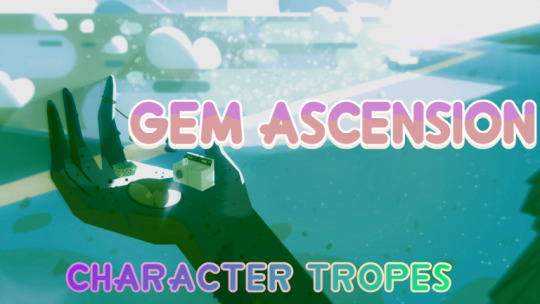

Primary General Post ♫ Full Article ♫ Primary Peri Post
Affectionate Nickname: Paternal Unit Universe (PUU for short) by Peridot. Near the end of Act III, she designates a new nickname for him: Papa.
The Bard: Literally offers to supply this role in Chapter 8 of Act II. Honestly, even in Act I, he could he considered this.
Cloud Cuckoolander: Downplayed, but he does show shades of it in GA.
The Driver: Is a Non-Action Guy, is taught the spaceship’s controls (and ends up piloting it in Act III), and is charged with protecting their ship while the gems embark on the rescue mission. Peridot even gives him the title of “chauffer” and admits she enlisted his help out of sheer desperation. She is ultimately happy to have recruited Greg on the team, however, and while he’s by far the least-featured and least-developed of GA’s initial cast, Greg does subvert this trope a bit in that he does do other things that make him too significant to just be a stock character.
The Everyman: Out of the entire cast, Greg is this by default. Even with the radical changes many of his fellow teammates go through in this continuity, even his Rank Up doesn’t pull him out of this trope; it’s shown that due to the limitations of real life for ordinary humans, Greg is more of a part-time Crystal Gem (unless a situation truly calls for his presence, like the GA main series).
Expy: As far as his role in Peridot’s division of the Crystal Gems is concerned, it’s Lampshaded more than once that Greg is basically Peridot’s, Lapis’, and Bismuth’s equivalent of Steven. Most of the contributions he makes to Peridot’s team are very Steven-like in nature.
Four-Philosophy Ensemble
The Apathetic: As the designated heart of Peridot’s division, Greg’s good at being a mediator during team squabbles as he can maintain neutrality, is largely not involved in the grand scheme of his team’s mission (for perfectly justifiable reasons), being the token human of the foursome makes him a bit of an oddball as he has vastly different goals and priorities to his life, but is banding together with the gems for a strong, common cause. He’s an easy-going dude who’s largely content to be where he is at this stage in his life and sees his role on the team as passive support more than anything else. It’s not a flashy role by any means, but it’s necessary more often than one would think.
Four-Temperament Ensemble: Is the Phlegmatic of Peridot’s division. Shared traits include: calm and mellow dude, very humble, assists as best a Non-Action Guy can, discreet (so much that he’s trusted as The Shrink of the team), flexible, patient, modest, a nice guy, perceptive, compassionate, open-minded, a good listener, a bit on the lazy side, content to go his own pace even if it’s at a snail’s rate, easy to scare, easy-going, and appreciates good humor.
Good Samaritan: Greg refuses to stand by and do nothing in the GA continuity. His son is in danger on a distant, faraway planet, and while he trusts the Crystal Gems, the fact that there are so few remaining who can help save everyone (with two of the three remaining gems being relative newcomers in the team) compels him to chip in however he can. While Greg’s range of utility is greatly limited, he not only goes out of his way to aid Peridot, Lapis, and Bismuth by bonding with them as they work (as he’s aware that unlike the OG team, Greg is not nearly as familiar with these three and wants to rectify that right away), but has the balls to risk going to Homeworld personally. Twice. Granted, he doesn’t get involved in either mission once they touchdown on Homeworld, but Greg’s duty to protect the spaceship carries a variety of risks in its own right. So much that Peridot made sure to equip him with a wide range of gadgets even he can use to defend himself in a worst-case scenario. By Act III, Greg’s even learned how to fly the spaceship itself. He also plays a big role in helping Lapis and Bismuth reconcile their differences early in Act I so that their tension won’t become an issue later once they’re officially on their mission.
The Heart: Of Peridot’s division, much like Steven is for Garnet’s.
Heroic Bystander: Greg easily could have just stayed out of everything in Act I, and no one would have blamed him for it. While his limitations as an ordinary human being do hinder Greg’s ability to contribute to the Crystal Gems and their rescue effort, Greg couldn’t bear to just sit on the sidelines while his son and many friends he grew up alongside were imperiled on another planet in a distant galaxy, not knowing what really happened and whether or not they were all okay. He definitely made the most with the few contributions he did put in; in Act II and III, Greg’s contributions skyrocketed. He even eventually learned how to pilot a spaceship; until Celadon Diamond destroyed it, Greg was actively keeping the ship safe while keeping an eye on his comrades below once they needed a lift.
Like a Daughter to Me: Greg expresses this sentiment to Peridot after their first heart-to-heart moment late in Chapter 1 of Act I. Once he watches Peridot’s Video Will to him during Chapter 6 of Act II, Greg outright tells everyone in the following chapter that Peridot’s message to him sounded like a plea for permission to marry his son. When Garnet asks Greg if he’s starting to see Peridot as a daughter-in-law, he confirms that he is indeed feeling that way.
Nice Guy: The apple doesn’t fall far from the tree, so it’s no surprise Greg shares this with Steven.
Non-Action Guy: Per canon, Greg has zero utility in combat situations and is relegated solely to supportive roles outside of battle and transport. Still, it takes some balls to be willing to go to Homeworld at all, and he does so twice in GA.
Open-Minded Parent: Per canon, Greg has long accepted that his son can’t not be involved in the Crystal Gems’ affairs, especially now that he knows that Rose was Pink Diamond all along (which effectively makes his son her successor as a Diamond). Greg has gained more of an appreciation with Steven’s involvement with the Crystal Gems now that he’s officially one himself (as of late Act II, though technically Peridot had considered him one throughout most of Act I), and while the Era 3 project is well over his head, he’s more than ready to help Steven out in any way he can and supports whatever he does… while at the same time making sure Steven is keeping on the straight and narrow.
Out of Focus: Due to Greg being a Non-Action Guy who needs to protect the Crystal Gems’ escape vehicle, he’s only present in the first three chapters of Act I and the tail end of the eighth. He does get a good amount of focus in Act II, but come Act III, he’s once again separating from the main group by the third chapter. However, he becomes a point of interest again in Chapter 7 and remains with the main cast in the story from that point all the way until the end.
Parents as People: Per canon, Greg’s identity as Steven’s father is not his sole defining trait. In GA especially, such as Act I while he and Steven are separated, and most of Act II when Steven is in an Angst Coma, Greg shines as a character in his own right and has plenty of bonding moments with the other gems; Peridot, Lapis, and Bismuth especially. Rose is also seldom mentioned in GA, so despite Greg by far getting the least amount of active time compared to his teammates of Peridot’s division, he still has more of an overall presence, relevance, and development than the likes of Connie, Pearl, and Amethyst.
Rank Up: Greg has known the Crystal Gems for decades, but until Chapter 6 of Act II, he was never an official member of the team. While his contributions have solely been passively supportive in nature, Greg has made a difference in the dynamics of Peridot’s team. While he was initially recruited/drafted by Peridot out of sheer desperation, Peridot later says she was glad to bring him along and considered him the heart of the team. In her Video Will to Greg, she makes it clear that as far as her team is concerned, he is a Crystal Gem. When Bismuth and Lapis learn of this, they’re quick to inform the rest of the team. While there’s initially some controversy to this (primarily via Pearl being staunchly against the concept of considering Greg part of the team), Garnet fully endorses Peridot’s decree and welcomes Greg as an official member of the Crystal Gems.
The Shrink: Inadvertently becomes one for Peridot within the very first chapter, and later becomes this for everyone else by the end of Act II. As far as Peridot is concerned, he is almost solidly a Type 3 (though has some Type 2 traits). If he wasn’t, it’s doubtful he would have continued this role past the first act.
The So-Called Coward: While Greg is incapable of directly aiding the Crystal Gems in battle and thus rightfully keeps his distance from those situations, no one can deny the man’s bravery for being willing to take the risk to go to Homeworld… not once, but twice. While his duties are low-key and low-risk, Greg is putting his life on the line just as much as his more active teammates just by coming along for the ride. And he does so without hesitation on both occasions; Greg really is willing to step up and do whatever he can to help Steven and the Crystal Gems as a whole. Even though Peridot technically drafted him, Greg had already volunteered to be part of the initial rescue mission.
Token Human: Of Peridot’s division of the Crystal Gems, Greg fulfills this role to the letter.
#gem ascension#gem ascension tropes#gem re:ascension#ga references#tv tropes#steven universe#stevidot#su fanfic#su fanfiction#greg universe#peridot#su peridot#lapis lazuli#su lapis#bismuth#su bismuth#garnet#su garnet#amethyst#su amethyst#pearl#su pearl#connie maheswaran#pink diamond#headcanon
0 notes